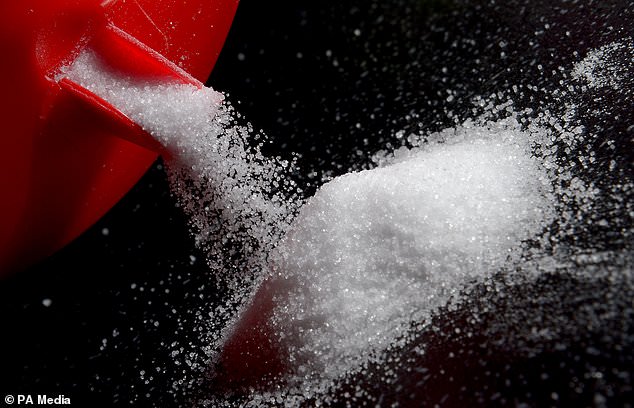Switching to a salt substitute could prevent thousands of heart attacks and strokes each year, a major study suggests.
Healthier salt options, which contain added potassium and less sodium, are already available on UK supermarket shelves.
More than 20,000 people who had previously suffered a stroke or were over 60 and had high blood pressure were involved in the research.
Half were asked to take a salt substitute containing 70 per cent sodium chloride and 30 per cent potassium chloride for five years. The other participants continued using regular salt, which is 100 per cent sodium chloride.
Scientists found those using the salt substitute were around 14 per cent less likely to have a stroke or heart attack.
The replacements, which taste like normal salt, have previously been linked to lower blood pressure. But the research, carried out in China, is the first to associate them to a reduced risk of strokes and heart attacks.
Nearly 35,000 Britons and 800,000 Americans suffer a stroke every year, and heart attacks are even more common. Both can be caused by high blood pressure.

New research suggests thousands of strokes and heart attacks could be prevented annually in the UK if diners were to replace salt with a common substitute (Anthony Devlin/PA)
Why should I buy salt substitutes containing potassium?
Standard salt (table, sea or rock) is chemically 100 per cent — or very close to 100 per cent — sodium chloride.
But in ‘low-salt’ products such as LoSalt in Sainsbury’s, up to two-thirds of the sodium part is replaced by potassium, another mineral that tastes ‘salty’.
Potassium is lacking in many people’s diets (17 per cent of UK adults have intakes that put them at risk of deficiency).
It is needed for healthy muscles and nerves — and for normal blood pressure.
Studies have previously linked the supplements, which taste like normal salt, to lower blood pressure.
And research published in the New England Journal suggests they could slash the risk of strokes or heart attacks — preventing thousands of cases every year.
A quarter teaspoon serving of Lo Salt contains 450mg potassium — 23 per cent of an adult’s daily amount.
However, some of these potassium-based substitutes can still be up to 50 per cent sodium chloride.
Also, if you have kidneys that do not function well (because of diabetes, for example), too much potassium may be harmful, so check with your doctor first.
Advertisement
Heart experts today praised the study as providing a ‘helpful reminder’ over the benefits of cutting back on salt.
But they warned the study, which involved more than 20,000 people living in villages across rural China, may not be applicable to Britain.
British people eat more processed food that already contains high levels of salt, a habit which has prompted calls for the food industry to switch to low-sodium salt as well.
Chinese villagers, on the other hand, normally cook from scratch meaning they have to add salt.
Victoria Taylor, senior dietician at the British Heart Foundation, said: ‘This research is a helpful reminder to cut the amount of salt we have in our diets and to look for other alternatives.
‘However it’s not necessarily applicable to the UK population.
‘The group of people studied were from rural China, and so diets, lifestyle, and salt intakes are probably different.
‘They also only included people with a previous history of stroke or people that were aged 60 years and older with poorly controlled high blood pressure.’
However, the researchers insisted ‘millions of lives would be saved by this simple approach’.
Results showed there were 29.14 strokes per 1,000 person-years among those who ate the substitute, compared to 33.65 for those who got normal salt.
For heart attacks there were 49.09 per 1,000 person-years among those who got the supplements, and 56.29 for those who got normal salt.
The study’s authors concluded: ‘Among persons who had a history of stroke or were 60 years of age or older and had high blood pressure, the rates of stroke, major cardiovascular events, and death from any cause were lower with the salt substitute than with regular salt.’
Professor Bruce Neal, from the George Institute for Global Health in Sydney and who led the study, told The Times: ‘If you were to replace all of the salt on the supermarket shelves [in the UK] with salt substitutes you would prevent thousands of strokes and heart attacks every year — that’s quite safe to say.’
The study was published in the New England Journal of Medicine.
Professor Graham MacGregor, a cardiovascular medicine specialist at Barts hospital who was not involved in the research, told the newspaper: ‘This very important study clearly demonstrates that [in the UK] consumers should be encouraged not to add salt to food, but if they have to, it’s vital that they use a reduced sodium with added potassium salt.’
He added: ‘The food industry can reduce the huge amounts of salt they add to food, and safely replace it where necessary with potassium salt.’
The study, addresses concerns that low-sodium salt, could lead to hyperkalemia – an excess of potassium in the blood which can cause fatal heart rhythm changes.
Experts found the risk of clinical hyperkalemia was no higher in people using the salt substitute.
But they did not routinely measure everyone’s blood potassium levels, so may have missed some cases.
Source link : https://www.dailymail.co.uk/health/article-9939193/Salt-substitute-prevent-thousands-strokes-heart-attacks.html











